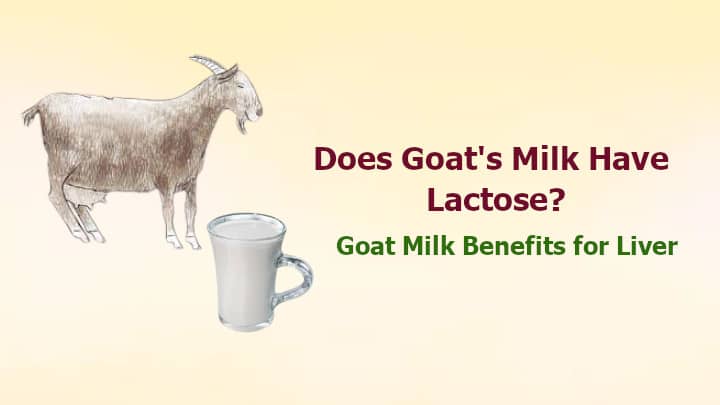Goat Milk Benefits for Liver: Does Goat’s Milk Have Lactose?

Looking for goat milk benefits for Liver? People have consumed goat milk for many years, and it is frequently recognized for its possible health advantages. The effect of goat milk on the liver’s health is one area of interest.
A vital organ, the liver is responsible for several internal processes, including digestion, nutrition storage, and detoxification. With risk factors including obesity, alcohol use, and viral infections, liver disease is a severe health problem worldwide.
According to research, consuming goat milk may boost liver health, lowering the risk of liver disease. However, the lactose level of goat milk should be considered, especially for those who are lactose intolerant.
In this article, we will look into the possible benefits of goat milk for liver health and whether goat milk contains lactose.
In This Article
Goat Milk Benefits for Liver
Here we have listed 11 benefits of goat milk for liver health in detail:

1. Help in Prevention of Fatty Liver
Fatty liver is a condition in which excessive fat accumulates in the liver, causing inflammation and scarring.
Goat milk has medium-chain fatty acids that are readily digested and absorbed by the liver, helping prevent the fat formation in the liver.
2. Supports Liver Detoxification
The liver filters toxins and other harmful byproducts from the body. Goat milk is high in vitamins and minerals, including B12, C, and selenium, which can help improve liver function and aid in detoxifying.
3. Minimizes Inflammation
Inflammation in the liver can lead to liver damage and disease. Anti-inflammatory components in goat milk, such as bioactive peptides and proteins, can help decrease inflammation in the liver and prevent future damage.
4. Provides Essential Nutrients
To function correctly, the liver needs various nutrients, such as vitamins, minerals, and amino acids. These essential minerals, such as vitamin B12, vitamin C, zinc, and selenium, are abundant in goat milk.
5. Boost Digestive function
Goat milk boosts digestive function due to the portal vein’s connection to the gut and liver, and the gut microbiome’s health has been related to liver health.
In goat milk, such as oligosaccharides, prebiotics can stimulate the development of good gut bacteria and enhance overall gut health, which may also be advantageous to the liver.
6. Strengthens Immunity
The immune system is essential in defending the liver from infection and disease. Immunoglobulins, proteins that can help strengthen the immune system and protect against infections, are found in goat milk.
7. Reduces Cholesterol
High cholesterol levels might worsen the function of the liver.
Medium-chain fatty acids and conjugated linoleic acid are two substances found in goat milk that may help decrease cholesterol levels (CLA).
8. Helps in Liver Regeneration
The liver can renew itself, but it needs proper nutrition and support. Goat milk is high in protein and necessary amino acids, aiding liver repair.
9. Lower the risk of Liver cancer
According to specific research, consuming goat milk may help lower the incidence of liver cancer. This might be due to anti-cancer bioactive substances such as lactoferrin and immunoglobulins.
10. Source of Hydration
Staying hydrated is essential for liver health. Goat milk is a good source of hydration and can help prevent dehydration, which can stress the liver.
11. Easy to Digest
For those with liver illness who might have difficulty digesting other forms of milk, goat milk is an excellent alternative since it is simpler to digest than cow’s milk.
Does Goat’s Milk Have Lactose?
Yes, goat’s milk does contain lactose, but the lactose content is slightly lower than cow’s milk. Additionally, goat’s milk has a different type of casein protein and may be easier to digest for some individuals.
For those allergic to cow’s milk proteins or lactose intolerance, goat’s milk is a common alternative to cow’s milk. Many people are curious whether goat’s milk includes lactose, even though it is frequently offered as a more readily absorbed substitute for cow’s milk.
In milk and other dairy products, a form of sugar is called lactose. Glucose and galactose are the two simple sugars that make it up.
An enzyme called lactase, produced by the small intestine breaks down lactose. Lactose intolerance results in bloating, gas, and diarrhoea because the body does not create enough lactase to break down lactose adequately.
While goat’s milk does contain lactose, the lactose content is lower than cow’s milk.. On average, cow’s milk contains about 4.7% lactose, while goat’s milk contains about 4.1% lactose.
While this may not seem like a significant difference, it can make a difference for those sensitive to lactose.
In Closing
In summary, goat milk has shown significant benefits for the liver’s health, including lowering inflammation, boosting antioxidant status, and promoting healthy cholesterol levels.
While goat milk includes lactose, it does so at a lower concentration than that found in cow’s milk, making it more tolerable for those lactose intolerant.
References
- Goat Milk Consumption Enhances Innate and Adaptive Immunities
- Goat Milk Oligosaccharides: Their Diversity, Quantity
- Goat Milk in Human Nutrition and Health – A Review





